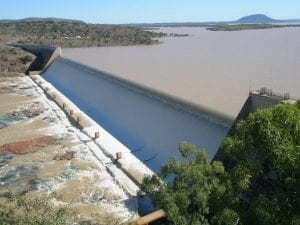Further doubt has been cast over the viability of what would be one of the world’s biggest coal mining and export operations in Queensland, after two more global banking giants said they would not back the development of the huge Carmichael coal deposit or the expansion of the nearby coal port.
US-based banking and financial services multinationals Citigroup and Morgan Stanley confirmed this week that they would avoid investment in the proposed Abbot Point port expansion, located near the Great Barrier Reef, and the adjoining coal mines in the Galilee Basin.
Two other US banks, JPMorgan Chase and Goldman Sachs, have also committed to steering clear of the projects. And Deutsche Bank, Royal Bank of Scotland, HSBC and Barclays publicly ruled out investments in the coal port earlier this year.
The banks’ statements come less than a week after an industry briefing from the Institute for Energy Economics and Financial Analysis (IEEFA) described the Queensland coal projects’ huge scale, greenfield nature and foreign ownership as carrying “an almost unprecedented level of financial complexity and risk.”
The Galilee Basin includes a prospective mine owned by India’s Adani and GVK companies and also Clive Palmer, head of the Palmer United Party.

IEEFA analyst Tom Sanzillo says the projects are commercially unviable, “reflective of the enormous capital investments required, the relatively low quality thermal coal involved, globally depressed seaborne coal prices and the lack of any of the necessary infrastructure required.”
Sanzillo said the Galilee coal project proposals are highly unlikely to proceed without the support of the four Australian bank majors, plus some of the nine leading global investment banks.
Gaining this support is looking increasingly unlikely, though, especially in light of the stance taken by Morgan Stanley, which it turns out has been hired by Adani to sell part of its stake in the Abbot Point coal port.
Adani disclosed Morgan Stanley’s role after the bank sent a letter to US-based environmental group Rainforest Action Network saying it doesn’t knowingly finance extractive activities in World Heritage sites.
“Morgan Stanley will not lend to or invest in the expansion of Abbot Point,” said the letter, which has been viewed by The Wall Street Journal.
This was reiterated by a Morgan Stanley spokesman in Australia who, according to The Australian stressed that the bank was only involved in the existing terminal, and was “not in the business of providing greenfield project financing in Australia.”
“Therefore, as we have stated, we will not lend to, or invest in, these projects,” the spokesman said. “We take environmental issues very seriously and in financing any project we always examine the potential environmental impacts.”
And the environmental issues are many – such as the need to dredge at least 3 million tonnes to expand the coal port, and dump the spoils on the nearby World Heritage-listed Great Barrier Reef. Not to mention the increased shipping traffic in the area, to cater to mines with the potential to export as much as 330 million tonnes of coal a year.
Despite the federal environment minister’s assurances that this all was nothing to worry about, it seems to be pricking the consciences of the international banks.
As the letter from Citi’s director of corporate sustainability, Valerie Smith, notes, the bank’s internal rules generally prevent finance for “new mining projects within the boundaries of a World Heritage Site.”
Meanwhile, in Australia, one of the world’s top solar R&D hubs, the University of New South Wales (UNSW), has decided against joining the Australian National University (ANU) in a shift towards fossil fuel divestment.
Earlier this month, the ANU Council agreed to a proposal by Vice-Chancellor Professor Ian Young to begin divestment of stocks in seven fossil fuel-linked companies following an independent review of the university’s domestic equities.
But in a meeting last week, the UNSW Council resolved “overwhelmingly” not to withdraw from fossil fuel investments, despite its stated position of taking the issue of greenhouse gas emissions and global warming “very seriously”.
In a statement on Monday, UNSW said it currently held investments of about $50 million in a portfolio of $309 million in companies involved in fossil fuels. The investments are held indirectly, through unit trusts whose managers decide on specific stock allocation.
In an email to staff, UNSW President and Vice Chancellor, Fred Hilmer said the university council felt it could contribute more to climate action through partnerships than through “token political actions.”
Taking a line currently popular with the federal Abbott government, Hilmer said the UNSW recognised that fossil fuels would be needed for many years to come “to provide the energy and materials on which millions of lives depend.”
And he quoted Drew Faust, President of America’s Harvard University, who warned against using investment funds in ways “that would appear to position the University as a political actor rather than an academic institution”.
Said Hilmer: “Conceiving of the endowment not as an economic resource, but as a tool to inject the University into the political process or as a lever to exert economic pressure for social purposes, can entail serious risks to the independence of the academic enterprise. The endowment is a resource, not an instrument to impel social or political change.”
Hilmer was once chairman of NSW government’s former coal generator Pacific Power. Other members of the UNSW council include ANZ chairman David Gonski, NAB director and former environmental lawyer Jillian Segal, Origin Energy director Maxine Brenner, UBS country head Matthew Grounds, and Warwick Negus, the founder of funds manager 452 Capital.










